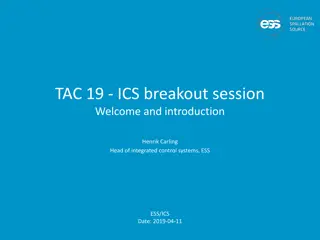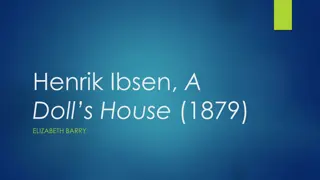Exploring Henrik Ibsen's Iconic Play: Hedda Gabler
Discover the intricate plot of Henrik Ibsen's classic play, Hedda Gabler, as the protagonist Hedda seeks and grapples with control in her life, ultimately leading to tragic consequences. Set in a lavishly furnished drawing-room, the story unfolds through acts of creation and destruction, culminating in a realization of self-entrapment. Dive into the themes of power dynamics, relationships, and the complexities of human nature portrayed in this gripping drama.
Download Presentation

Please find below an Image/Link to download the presentation.
The content on the website is provided AS IS for your information and personal use only. It may not be sold, licensed, or shared on other websites without obtaining consent from the author. Download presentation by click this link. If you encounter any issues during the download, it is possible that the publisher has removed the file from their server.
E N D
Presentation Transcript
Hedda Gabler Henrik Ibsen
Act 1: The Tesmans return from their honeymoon Hedda seeks control Act 2: Hedda s relationship with Brack and Lovborg Hedda gains control Act 3: The aftermath of the party Hedda exerts control through acts of creation and destruction Act 4: Death Hedda comes to recognize that by seeking control, she has ensnared herself
A large drawing-room, handsomely and tastefully furnished; decorated in dark colours. In the rear wall is a broad open doorway, with curtains drawn back to either side. It leads to a smaller room, decorated in the same style as the drawing-room Downstage stands an oval table, covered by a cloth and surrounded by chairs. Downstage right, against the wall, is a broad stove tiled with dark porcelain; in front of it stand a high-backed armchair, a cushioned footrest and two footstools. Upstage right, in an alcove, is a corner sofa, with a small, round table... Upstage of the french windows, a piano Above this sofa hangs the portrait of a handsome old man in general's uniform. Above the table a lamp hangs from the ceiling, with a shade of opalescent, milky glass (Act 1)
MISS TESMAN (stops just inside the door, listens, and says in a hushed voice)Well, fancy that! They re not up yet! BERTHA (also in hushed tones)What did I tell you, miss? The boat didn't get in till midnight. And when they did turn up Jesus, miss, you should have seen all the things madam made me unpack before she'd go to bed! (Act 1)
The effect of the play depends a great deal on making the spectator feel as if he were actually sitting, listening, and looking at events happening in real life. Ibsen, letter to August Lindberg, director of Ghosts in 1884, quoted in Christopher Innes, ed., A Routledge Literary Sourcebook on Henrik Ibsen s Hedda Gabler, Routledge Literary Sourcebooks (London : Routledge, 2003), 32.
Afenposten (Norway): We neither understand nor believe in Hedda Gabler. She is not related to any one we know. Fortnightly Review (England): The real women of Norway and Germany should be angry at Ibsen for inventing [Hedda]. She is malignant to the point of murder with no sufficient cause. Quoted in Joan Templeton, Ibsen s Women (Cambridge: Cambridge University Press, 2001), 204.
The title of the play is Hedda Gabler. My intention in giving it this name was to indicate that Hedda as a personality is to be regarded rather as her father s daughter than as her husband s wife. Ibsen, letter to Count Moritz Prozor, his French translator, Dec 4 1890, quoted in Christopher Innes, ed., A Routledge Literary Sourcebook on Henrik Ibsen s Hedda Gabler, Routledge Literary Sourcebooks (London : Routledge, 2003), 32.
First she discovers that she isnt very good at sex and for Hedda Gabler to discover that she isn t very good at anything is a terrible shock. All these years men have been saying, You re the greatest; if only we had the opportunity, wouldn t it be wonderful. Somebody then gets the opportunity and it is not so wonderful. When she says the honeymoon was boring, what she s actually been is a total failure. Glenda Jackson, quoted in Christopher Innes, ed., A Routledge Literary Sourcebook on Henrik Ibsen s Hedda Gabler, Routledge Literary Sourcebooks (London : Routledge, 2003), 96.
I am not even quite clear as to just what this women s rights movement really is. To me it has seemed a problem of humanity in general. Ibsen to the Norwegian Women s League, 26 May 1898, quoted in Gail Finney, Ibsen and Feminism, in The Cambridge Companion to Ibsen, ed. James McFarlane (Cambridge University Press, 1994), 90.
Edmund Gosse (1891): Good God people dont do such things. Una Ellis-Fermor (1950): But merciful God! One doesn t do that kind of thing! James McFarlane (1966): But, good God almighty People don t do such things! Henry Beissel (1983): But, good God! That sort of thing just isn t done! Nicholas Rudall (1992): God people people don t do things like that. Quoted in Christopher Innes, ed., A Routledge Literary Sourcebook on Henrik Ibsen s Hedda Gabler, Routledge Literary Sourcebooks (London : Routledge, 2003), 102.
Even if the Norwegian society of her day had allowed her to rise to the Chief Executive Officer of the firearms industry, Hedda would still have been sadomasochistic, manipulative, murderous, and suicidal. Harold Bloom, quoted in Joan Templeton, Ibsen s Women (Cambridge: Cambridge University Press, 2001), 206.
A truly brilliant production of Hedda Gabler must make us realize that even if or rather, particularly if Hedda had become a general or a prime minister, she would still have felt unfree, isolated, incapable of love. Toril Moi, Hedda s Silences: Beauty and Despair in Hedda Gabler., Modern Drama 56, no. 4 (Winter 2013): 436.
The source of Heddas frustration is not that she cannot have what she wants, but that her desires are so channeled and circumscribed by inhibition and self-disgust that, even when she does get what she wants, its achievement only emphasizes the poverty of what she can bring herself to desire. Robin Young, Time s Disinherited Children: Childhood, Regression and Sacrifice in the Plays of Henrik Ibsen (Norwich: Norvick Press, 1989), 146.















